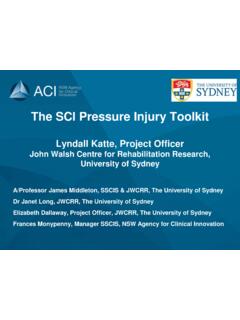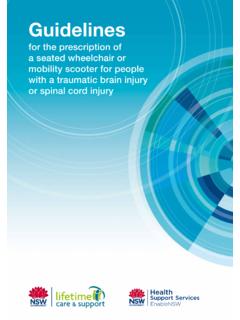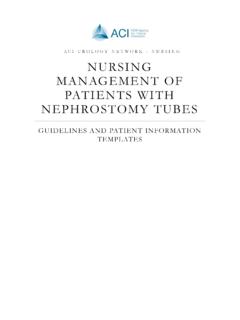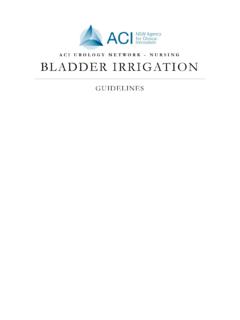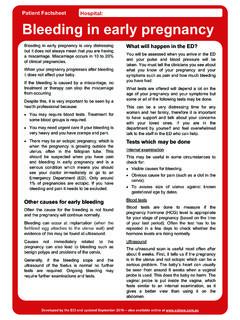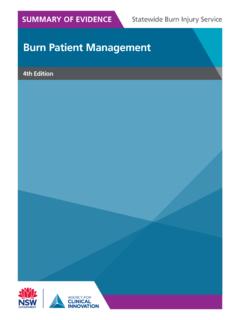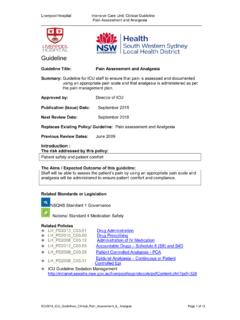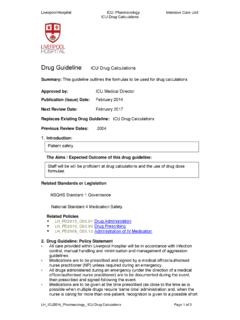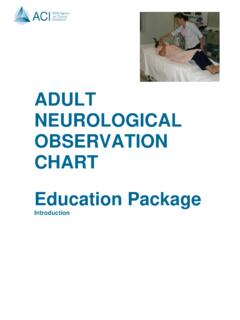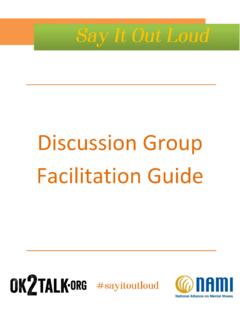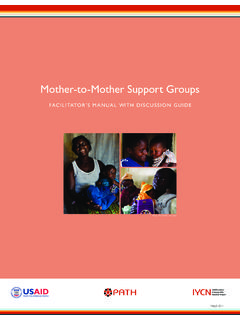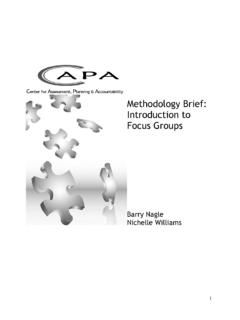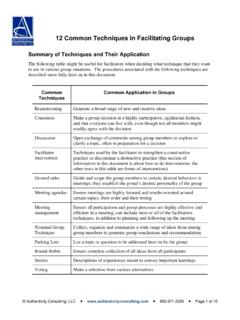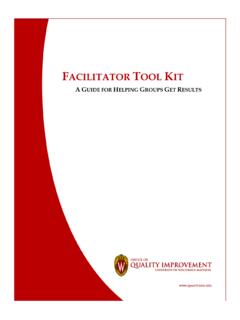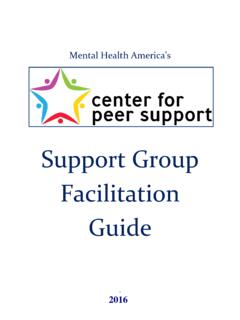Transcription of Participant experience focus groups: Facilitation guide
1 Collaboration. Innovation. Better experience focus groups: Facilitation guideChronic Care NetworkGUIDEC hronic Care Network Participant experience focus groups: Facilitation guide Page iAGENCY FOR CLINICAL INNOVATIONL evel 4, Sage Building 67 Albert Avenue Chatswood NSW 2067PO Box 699 Chatswood NSW 2057 T +61 2 9464 4666 | F +61 2 9464 4728 E | (ACI) 150348, ISBN 978-1-76000-211-4 Produced by: Chronic Care NetworkFurther copies of this publication can be obtained from the Agency for Clinical Innovation website at.
2 Content within this publication was accurate at the time of publication. This work is copyright. It may be reproduced in whole or part for study or training purposes subject to the inclusion of an acknowledgment of the source. It may not be reproduced for commercial usage or sale. Reproduction for purposes other than those indicated above, requires written permission from the Agency for Clinical Innovation. Version: Amended: 26/09/2016 Agency for Clinical Innovation 2016 The Agency for Clinical Innovation (ACI) works with clinicians, consumers and managers to design and promote better healthcare for NSW.
3 It does this through: service redesign and evaluation applying redesign methodology to assist healthcare providers and consumers to review and improve the quality, effectiveness and efficiency of services. specialist advice on healthcare innovation advising on the development, evaluation and adoption of healthcare innovations from optimal use through to disinvestment. initiatives including Guidelines and Models of Care developing a range of evidence-based healthcare improvement initiatives to benefit the NSW health system.
4 Implementation support working with ACI Networks, consumers and healthcare providers to assist delivery of healthcare innovations into practice across metropolitan and rural NSW. knowledge sharing partnering with healthcare providers to support collaboration, learning capability and knowledge sharing on healthcare innovation and improvement. continuous capability building working with healthcare providers to build capability in redesign, project management and change management through the Centre for Healthcare Clinical Networks, Taskforces and Institutes provide a unique forum for people to collaborate across clinical specialties and regional and service boundaries to develop successful healthcare innovations.
5 A key priority for the ACI is identifying unwarranted variation in clinical practice. ACI teams work in partnership with healthcare providers to develop mechanisms aimed at reducing unwarranted variation and improving clinical practice and patient Care Network Participant experience focus groups: Facilitation guide Page iiAcknowledgementsWe thank the ACI Chronic Care Network Executive and the Participant experience focus Groups Working group for their support and guidance of this also thank the following groups for their involvement in the development and review of this guide .
6 NSW Agency for Clinical Innovation Chronic Disease Management Implementation Working group NSW Agency for Clinical Innovation Consumer Council NSW Agency for Clinical Innovation Patient experience and Consumer Engagement (PEACE) Team Directors and Managers of Aboriginal Health Multicultural Health Managers Care Network Participant experience focus groups: Facilitation guide Page iiiGlossaryAbbreviationDescriptionLHDL ocal health districtNHMRCN ational Health and Medical Research CouncilSHNS pecialty health networkChronic Care Network Participant experience focus groups.
7 Facilitation guide Page ivTable of ContentsAcknowledgements iiGlossary iiiContents ivSection 1 Participant experience focus groups: Quick guide 1 Section 2 Introduction 3 Section 3 Capturing Participant experience : the eight dimensions of patient-centred care 4 Section 4 What is a focus group ? 6 Section 5 Ethical considerations 7 Section 6 Organising a focus group 8 Section 7 Facilitating focus group discussion 11 Section 8 Data collection.
8 Analysis and reporting 17 Section 9 Cost of implementation 19 Section 10 Using focus groups to hear Aboriginal voices 20 Section 11 Conducting multicultural focus groups 22 Section 12 References 23 Section 13 Appendices 24 Appendix A Example invitation call script 24 Appendix B Example letter and Participant information sheet 25 Appendix C Example consent form and confidentiality undertaking for participation in focus groups 28 Appendix D Example of focus group questions 30 Appendix E Dealing with difficult situations and troubleshooting 32 Appendix F Example Participant feedback form 36 Appendix G Example Participant thank you letter 37 Appendix H Reporting template 38 Chronic Care Network Participant experience focus groups: Facilitation guide Page Planning a focus Ethical considerations (including ethics approval)A number of ethical considerations arise when conducting focus groups.
9 Whether a focus group requires ethical approval depends on whether the project is for research or quality improvement and whether the project poses any ethical risk to NSW Health Guideline GL2007_020 Human Research Ethics Committee Quality improvement & ethical review: a practice guide for NSW provides advice on determining when quality improvement activities require ethical Resources requiredThe following resources are typically required to organise a focus group : project coordinator facilitator note-taker observer (optional).
10 Selecting a facilitatorA focus group facilitator: must be empathetic, sensitive and non-judgemental, and have the ability to build trust and actively listen may be external or internal to the organisation (although not someone who works with participants on a daily basis). Selecting a venueA suitable venue is one that: is accessible (close to public transport with adequate parking and disability access) has minimal noise, visual and other environmental distractions is ReportParticipant experience focus groups: Quick guideSection Recruiting participantsWhen identifying and inviting people to participate in a focus group , consider: group size (a large group may affect group dynamics).
